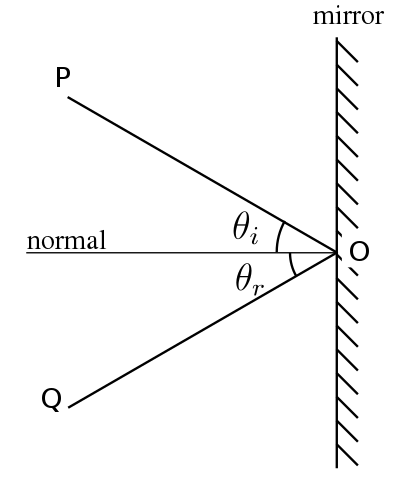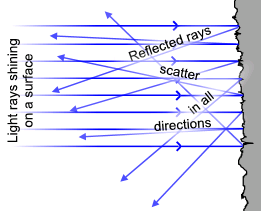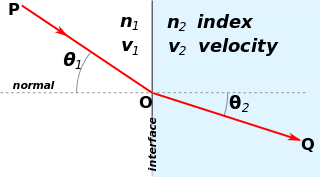
Hello dear friends and welcome to another episode of Myth or fact. First of all, thank you for your support. I’m glad to have the greatest reader ever. So here is a task for you. Tomorrow morning when you freshen up in the bathroom, have a look into the mirror and say aloud: “Tim Said likes me!” (Just kidding, don't do it please). You will see your good looking reflection and probably notice something. The little scar on your left cheek seems to be on the right cheek of your mirror image. The writing on your shirt is reversed too.
Obviously your mirror switches left and right. You see it with your own eyes. Correct? We will clarify some points.
Reflection of light
Before we come to the reflection itself let’s have a short recap of what light is. In my article about the sense of sight we learned that light is a form of electromagnetic (EM) radiation, to be accurate we need to speak of visible light because only a small portion of the actual EM spectrum is visible to the human eye. If you want to know more about the nature of light I recommend you to have a look at the article. Imagine you have a wavefront and this is traveling through a medium, let's say air. At the interface of another medium the direction of our wavefront changes. There we have two things, reflection and refraction. Following both are explained.
When the light ray approaches our mirror surface it is reflected. The incoming light ray is called incident ray (here Q) and the outgoing ray is called reflected ray (here P). The normal is an imaginary line to the mirror. The law of reflections says that the incident angle and reflected angle are equal. So when we point a laser to the surface of a mirror we can tell where the laser will be reflected to. This kind of reflection is also known as specular reflection
Fig.1 Illustration of specular reflection. Credits

There is also a diffuse reflection that occurs when the surface is not smooth. The reflected wavefront is scattered into many different directions since the reflection angle is not the same. Most of the reflected visible light that our eyes reaches are from diffuse reflection.
Fig.2 Illustration of diffuse reflection. Credits

Light can be either absorbed, transmitted or reflected. Usually we have a specular reflection on metal surfaces or water surfaces. When it comes to reflection however, in most cases light is transmitted through the medium and not totally reflected.
Fig.3 A spoon seems to bend. Credits

When light enters from one medium into another it can be bend or refract. This is because of the different refractive indices. The refractive index describes how a wave propagates through a medium. You might have read yesterdays myth or fact edition in which we talked about radioactive decay. I explained that light in vacuum moves faster than it does in water. The refractive index describes how much faster of slower light moves in different mediums.
It is defined by n=c/v with c the speed of light and v the phase velocity in the medium.
Fig.4 Schematic illustration of a ray moving through two different mediums. Credits

The refractive index of air is 1,0003 and of water 1,333. In the upper figure we can see that the light is bend towards the normal after entering the water.
After some little basics about reflection we get back to our topic: the mirror reflection. How does a mirror actually work and shows us a mirror image?
Mirror image
Whenever we look into a mirror we see an image of an object in front of the mirror. Light which is diffusively reflected from the object is reflected on the mirror and reaches our eye. This is happening with every single point of the object. The law of reflection tells us that incident and reflected angle are equal. Let us use this law on the picture above. The rays from the nose (1) are reflected and hit our eye. To our eye however it seems that this light comes from the other side of the mirror. This tells us that there is no reverse of left and right but front and back. When we look into the mirror and see our scar on the left side it is displayed on the left side of the mirror. We however think it's on the right. Our brain tricks us because we are used to see faces of human in reverse. When you see the face of someone, you see the left side of his face on your right and his right side on your left.
Fig.4 How a mirror image is constructed. Credits

To answer the myth we come to the conclusion that mirrors to not switch left and right but front and back.

I hope you enjoyed this episode of Myth or Fact. The next one will follow tomorrow.
-Tim
If a mirror did swap left and right, it would have to swap top and bottom too, right ? :P
As the mirror doesn't reverse any axis but invert along the third dimension it doesn't swap up and down. Follow the light trays :P
Your stuff is awesome man, glad I found you recently. This is almost just a case of semantics perhaps but you made knowing the differences interesting, and in this post only just a tiny bit over my head for once!
Thank you very much for your kind words and the support! Like I wrote, my readers are the best :)
extraordinary post, congratulations, beautiful words, now a time for reflection probocado its publication, congratulations and thank you very much for sharing
I thank you for taking your time to read and reply. Hope you will enjoy the next episode as well
Nice illustrations. It is a pity I am not lecturing wave mechanics anymore, otherwise I would have hired you for designing the figures of my lecture notes ;)
Great explanation, your diagrams are great too.
Very good post!
Yery good explanations, especially about the tricks of our brain looking to a mirror! Thank you, waiting for the next post :-)
Imagine a glass window when writings are reversed if you look from other side though that's still different from mirror, and mirror is actually the second reflection since first one is what our eyes sees.
I love the idea of 2 mirrors reflecting each other for eternity, that I think time and our lives are like that each image in rear mirror could be considered our past moments and front mirror is our future but with time every reflection is a different image but all are there at the same time, so in other word you can go back for eternity in time and still exist as well in the future.
This idea is truly mind blowing :)
So mirrors are like pages of a book if you hold a page in light you can see the content from both sides and just turning the page from left to right which does the same as back to front.